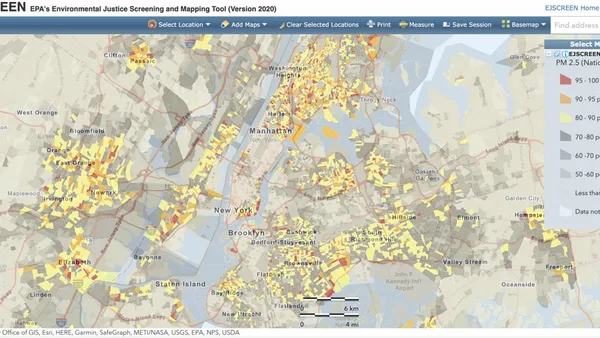Dive Brief:
- Fewer than half (47%) of large companies have identified how to gauge the sustainability of their operations despite rising pressure from investors, regulators and lawmakers for disclosure on environmental, social and governance (ESG) performance, Accenture said.
- “Many companies are still managing blind,” Accenture said after surveying 640 CFOs and other finance leaders worldwide. Nearly half (49%) of large companies are unable to determine the best metrics for ESG performance and derive useful insights.
- The ability of companies to raise capital "will increasingly be tied to sustainability objectives,” Accenture said. Yet “deficiencies in the ability of companies to target, manage, measure and report sustainability performance still hamper the ability of businesses to effectively deliver on their sustainability commitments.”
Dive Insight:
CFOs aiming to adopt ESG disclosure standards must currently choose from more than 15 competing sustainability reporting frameworks that vary in detail and scope.
The architects for global accounting rules aim to bring clarity and baseline uniformity to ESG performance disclosure through the International Sustainability Standards Board (ISSB), a panel launched at the COP26 climate conference in Glasgow in November.
The ISSB plans to gather opinions from shareholders, companies and other stakeholders and release an initial group of standards during the second half of this year. It aims to become the global standard-setter for sustainability disclosures.
The board “will begin with climate, due to the urgent need for information on climate-related matters,” and draw up both thematic and industry-based requirements, according to a statement by the IFRS Foundation, which oversees the International Accounting Standards Board.
Regulators are stepping up pressure for greater sustainability disclosure. The U.K. government is exploring changes in legislation that would mandate ESG reporting. Under a regime proposed by the European Union, companies would use a classification system to label in disclosures operations that are deemed sustainable.
In the U.S., Securities and Exchange Commission (SEC) Chair Gary Gensler has said agency staff are crafting a proposal for mandatory climate risk disclosures that will be considered by SEC this year.
Companies may need to report on metrics such as greenhouse gas emissions, financial impacts of climate change and progress towards climate-related goals, Gensler said in July, adding that he aims to ensure investor access to “consistent, comparable, and decision-useful disclosures.”
Such reports may be required in an expanded Form 10-K and describe a company’s direct and indirect carbon emissions, including those by suppliers and partners in its “value chain,” he said. The SEC rules will likely parallel, but not duplicate, global standards. Gensler has also asked staff to propose workforce disclosure rules.
“Meeting demands for sustainability data will be integral to company performance,” Accenture said, adding that “ESG matters to the market, and therefore to business value.”
Companies with high ESG performance from 2013 until 2020 generated 2.6 times higher total shareholder return than medium performers, Accenture said.
Making a CFO responsible for sustainability is essential for ensuring a company meets its ESG goals, Accenture said. “Companies are much more likely to extensively embed ESG in core management processes when the CFO has accountability for ESG metrics.”
Yet only 26% of finance leaders said they had clear, reliable data to back up their ESG metrics and 54% said insufficient skills or talent has impaired ESG measurement and reporting.
Half of investors believe company ESG reports lack substance, compared with only 38% of CFOs, accounting firm EY said last month in a survey, highlighting “a gap between how useful companies believe their ESG reporting to be and the views of investors who use it in their decision-making.”
CFOs currently fall short of meeting investor needs for reporting on ESG performance and need to quickly act to show how they will derive value for their companies from sustainable business practices, EY said.
Only 16% of financial executives said they subject their ESG reports to an independent audit, according to Accenture. It surveyed CFOs and other financial executives at companies with more than $1 billion in revenue in China, France, Germany, Italy, the U.K. and the U.S.















